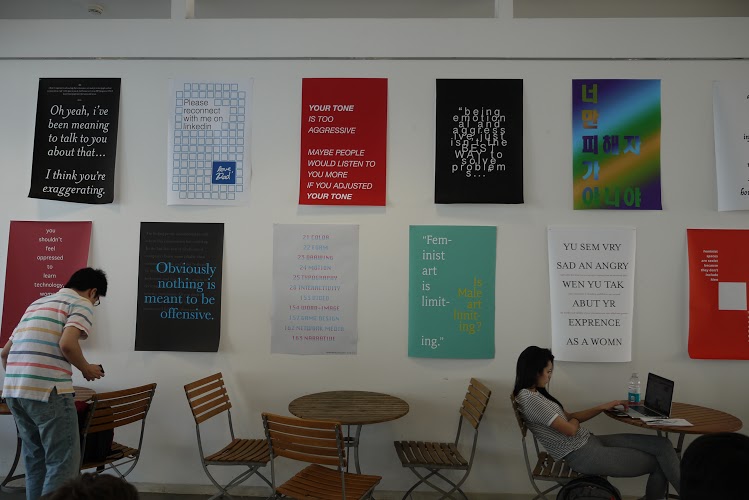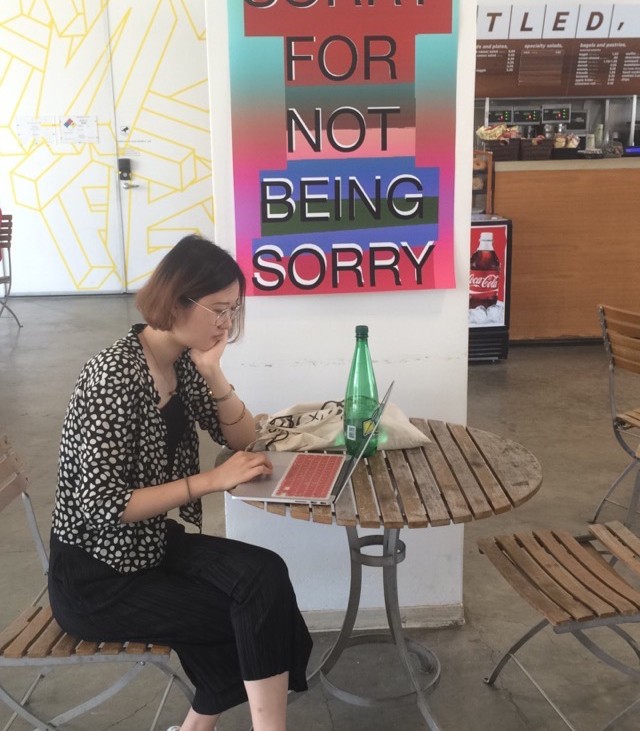Not So Sorry

Featured image courtesy of voidLab.
“YU SEM VRY SAD AN ANGRY WEN YU TAK ABUT YR EXPRENCE AS A WOMN.”
“I hope that wasn’t too technical for you.”
“Being emotional and aggressive just isn’t the best way to solve problems.”
Both within and outside the field of Digital Media Arts, microaggressions commonly come in the form of remarks from misguided peers. Because these comments are made individually and on a daily basis, there is an expectation that these harmful words will remain words and will go no farther than the space they were intended for. voidLab plans to silence these statements once and for all by making them impossible to avoid. This group is a feminist collective for women, non-binary, gender nonconforming, trans and queer people to express individual identities through arts and technologies.
voidLab has created and displayed their exhibition “Sorry for Not Being_____” which consists of 19 posters in the Untitled Café inside the Broad Art Center. Against the white walls, these posters scream with color and content that both express and combat statements that voidLab members have heard on an individual basis.
Yuehao Jiang, one of the artists of the exhibition, explained the importance of making sure microaggressions do not go unnoticed. She said, “Sometimes you feel like experiences are only happening to you when they’re really happening to a lot of people.”
Jiang’s poster is the perfect visual representation of how gender inequality can behave as a systematic practice. The poster lists 11 design and media arts classes offered at UCLA with different proportions of pink and blue. The colors indicate the percentage of either male or female TA’s in a certain class over the course of its existence. While classes such as Color, Drawing and Word+Image have had nearly entirely female TA’s, more technologically based classes such as Video and Game Design remain entirely blue. On top of this, Jiang’s use of pink and blue satirically comments on the way the UC system recognizes gender solely on the basis of the gender binary.

Kate Hollenbach, another member of voidLab, told a personal story of dealing with microaggressions in the workplace. She had presented an idea to a group of peers without receiving support. However, when a fellow male co-worker presented her idea with different wording, it was recognized. When Kate spoke up about the unequal treatment, she was told her tone was “too aggressive” and that perhaps people would listen to her more if she adjusted it.
What makes microaggressions so difficult to talk about is that when they occur, they feel as though they are happening to the individual and the individual alone. By coming together in a space where people can openly discuss similar experiences, those that have experienced microaggressions can learn how to effectively deal with them in the future.
Kate believes that the current system cannot remain as is. She states, “We need to change the education system and the rhetoric of ‘we’re all smart, college educated people’. It’s an ongoing learning process about caring for other people.”
Of course, these issues are not confined to the walls of the workplace. The microaggressions that are hardest to confront are those that come from our loved ones. voidLab member Hinsyu Lin explained, “It takes courage to speak out against microaggressions. We live with these people. We’re close to these people, which means that there is inevitable awkwardness.” By standing together, the members of voidLab have created an exhibition that turns the individualism of these statements on their heads and as a result, takes away their power.
“Obviously nothing is meant to be offensive.”
“Sorry for not being sorry.”
“You’re not the only victim.”




